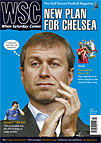 An FA Cup final between two teams outside the “Big Four” was a blessing
An FA Cup final between two teams outside the “Big Four” was a blessing
The fact that Portsmouth are to embark on their first ever season in Europe is an indication of one of the enduring strengths of the English league. Nowhere else in Europe are there teams with as many supporters who are yet to qualify for one of UEFA’s competitions. Portsmouth’s FA Cup victory still leaves several well supported clubs who are yet to play in Europe, notably Sheffield United, Charlton and Crystal Palace – although the last-named finished third in 1991 and would have done so but for the Heysel ban.
Part of the reason for so many clubs maintaining good levels of support is that for so long honours were spread around. Everton were the only team outside the current top four to win the FA Cup in 17 seasons up to Portsmouth’s victory, but there were 14 different winners in 20 seasons between 1968 and 1987. Such equality in trophy-winning has, of course, altered radically since the inception of the Premier League and especially over the past decade.
Clubs outside the top four have reached the latter stages each recent season, but too often they have little faith in their ability to claim the prize. From 1973 to 1980, Sunderland, Southampton and West Ham showed as Second Division sides that anyone could win the Cup on their day, something Brighton fell just short of achieving in 1983 after relegation. Which also meant that round by round, whatever the gap between sides, players went out with genuine belief. Crowds came in the same spirit: 30 years ago, attendances generally rose significantly for Cup games.
The FA Cup final is often said to have a global audience of some improbably huge figure – the current favourite guess is over a billion. In practice this simply means that a significant proportion of the population of each country that takes the live broadcast is presumed to be watching the match. Estimates of the total viewing statistics will be revised downwards this year because the final couldn’t be presented as a showpiece for some of the best players – and was all the better for it.
In the recent past, the dominance of the Cup by the big four had prompted concerns about the health of the competition, with attendances in decline away from the very biggest clubs. Some at the FA are now said to have been worried about the diminished global viewing audience for the 2008 final, while Sky were resigned to a fall-off in advertising revenues after Manchester United and Chelsea lost in the quarter-finals.
Concerns about profit – how much can be made and how much can be lost – seep into most public discussions about football now. Money’s corrosive influence is embodied by the increasingly absurd chief executive of the Premier League, Richard Scudamore, who popped up again on the final day of the season with a reminder, or warning, about his Game 39 plan. “Two hundred and seven countries will watch these games,” he said. “The audience will be huge today. At some point we have to address how we reach and satisfy that market.”
Meanwhile, clubs continue to justify fielding weakened teams in Cup ties on the basis that the first-choice players need to be saved for important League fixtures, whether they are at the bottom – notably Reading this season – or the top – Arsenal. You will have to forgive us for taking some comfort from these teams’ failure to achieve their League targets.
Of course there is monetary value attached to reaching a cup final, not least in boosting the transfer value of players involved, such as Cardiff’s Joe Ledley and Aaron Ramsey. Any manager who hasn’t taken the FA Cup seriously might feel that he was right if his team stayed up in the Premier League, earning the chance to be embroiled in another nine-month struggle against relegation next season. But all such managers will be envious of Harry Redknapp for entering the record books as a Cup-winning manager. There will no comparable TV retrospectives or public functions built around that glorious campaign to finish 15th or 16th, despite Redknapp’s own claim that avoiding relegation in 2006 was a greater achievement.
Cardiff v Portsmouth wasn’t a classic, but as even a moderately good game played between two sides who believed they could win it was a vast improvement on almost all the finals of the Premier League era. “Normal” service may be resumed next year, but the fact that these two teams contested the final after beating Barnsley and West Brom in the semi-finals would, in a sane world, give others hope that it could be them walking out at Wembley next year. Football long since parted company with sanity, alas.
From WSC 257 July 2008